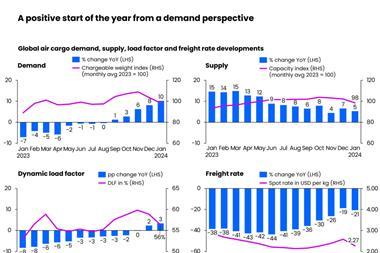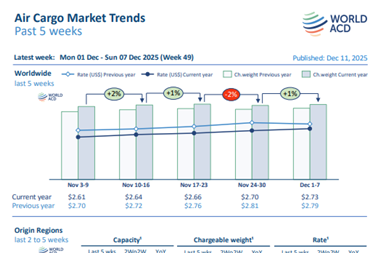
Ground handler dnata is implementing a two-day embargo on import shipments at its Dubai facilities as it tackles backlogs caused by a surge in demand.
The embargo began at midnight on Monday February 13 and will run until Wednesday at the same time.
The handler said that in January it had processed 76,000 tonnes of cargo at Dubai International and Dubai World Central, which represents a year-on-year increase of 45%.
The surge was particularly noted in imports of general cargo such as fast-moving consumer goods, electronics and fashion accessories.
At the same time, the company has been implementing a systems cutover.
“Amidst this massive surge in volume and ongoing system cutover recovery efforts, we're currently facing a backlog at our terminals. To expedite the recovery process and restore normal operations, we're implementing a temporary embargo on import loads of cargo," the company said.
“We understand the inconvenience this may cause and apologise for any disruptions to our customers' operations.
“We appreciate our customers' understanding and cooperation during this time. We remain committed to delivering efficient and reliable services as we work to resolve the situation."
Dnata added: "This growth underscores Dubai’s increasing popularity as a preferred route for cargo transportation, leveraging its robust infrastructure and global connectivity. Additionally, the evolving geopolitical landscape has also contributed to substantially increased demand for our services."
The air cargo industry has seen demand recover this year, while the Lunar New Year holiday surge coincides with the Red Sea crisis causing issues for container shipping.
Reports are mixed as to the impact the crisis is having on air cargo, but some forwarders have reported a rise in the use of sea-air solutions with products shipped to the Middle East and then flown to the final destination in Europe.
Data provider Xeneta recently reported that global air cargo volumes in January rose 10% year on year.
Some of January’s higher air cargo volumes are likely due to some shippers, especially in the apparel industry and producers of manufacturing components, shifting from ocean transport to air due to the need to move goods ahead of the Lunar New Year, said Xeneta.
The platform observed ‘extraordinary’ surges in air cargo volumes from China and Vietnam to Europe for three consecutive weeks in January, surpassing even their peak season highs.
Another data provider, WorldACD, also said that January's volumes were "significantly up" on a year ago.
WorldACD said that some of the increase in demand may reflect a switch to air or sea-air due to vessels diverting around the Cape of Good Hope as a result of attacks on ships passing through the Red Sea.
The timing of the Lunar New Year (LNY) holiday, which this year starts on February 10 rather than January 22, may also be playing a role in the increased volumes.
However, WorldACD said that from a data perspective, it was hard to separate out the potential Red Sea and LNY traffic from the normal seasonal mid-January uplift following the New Year slowdown.
//Subscribe to Air Cargo News’ twice weekly news updates and other digital products for free//















